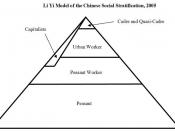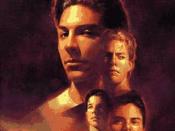Social class describes the different "layers" that exist in society. These "layers," or classes in society, are a division that civilization has been running on ever since the beginning of mankind. In most modern societies, our system of social class division is one of opportunity. We experience a good deal of social mobility, where people through generations or in their own lifetime can move up or down the social scale. By examining the many different perceptions of social class along with S.E. Hinton's The Outsiders, it is illustrated that social class has an impact on people while they are growing up, and will usually deny them from rising above adversity.
Many people have tried to figure out exactly what it is that makes up a particular social class. In Medieval times, the "Feudal System" was the structure of social division used among landowners. The nobles of the time were the landowners, who with their family tradition, privilege and knightly conduct became the dominant ruling group (Poore).
On the other hand, the peasants of this time were forced into extensive labor, rarely rising above their hardships. In the early 1900's, racial grouping was the structure used in the American South. The African Americans at the time were at the bottom of the social ladder, whereas the plantation owners who controlled them were at the top of the social ladder. Again, this class profiling rarely allowed the African Americans to upgrade on the ladder. In S.E. Hinton's The Outsiders, their structure of social class was focused on wealth, peer relations, fragile homes, and danger on the streets. As it seems evident throughout all of the different social class structures, the potential for social mobility does not appear very likely.
Discussing the facts of the book is important to serve as...


